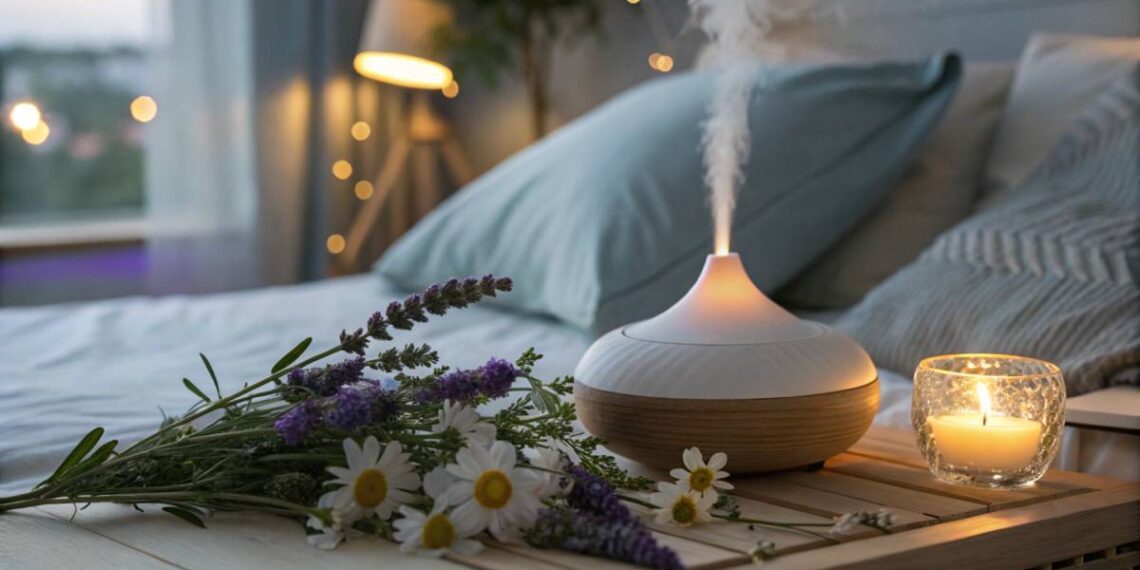Struggling to drift off after a long day? Discover the natural power of essential oils to transform your sleep routine. Among these aromatic wonders, lavender stands out for its timeless ability to promote relaxation and restful nights. But it’s not alone—chamomile, clary sage, and bergamot also offer unique benefits that can help you achieve deeper, more rejuvenating sleep. Whether you’re battling insomnia or simply seeking to enhance your nightly rest, integrating these essential oils into your bedtime ritual could be the key to unlocking peaceful slumber and overall well-being. Dive into the soothing world of essential oils and embrace a more restful you.
Key Takeaways
- Lavender’s Proven Benefits: Lavender essential oil is renowned for its ability to reduce stress and improve sleep quality, supported by numerous scientific studies.
- Diverse Oil Options: Beyond lavender, oils like chamomile, clary sage, and bergamot offer unique properties that enhance relaxation and sleep.
- Multiple Application Methods: Essential oils can be used in diffusers, applied topically, or blended to suit individual preferences and maximize sleep benefits.
- Synergistic Blends: Combining different essential oils can create powerful blends that address various aspects of sleep, from reducing anxiety to promoting deeper sleep phases.
- Safety and Precautions: Proper usage and dilution of essential oils are crucial to avoid adverse reactions, especially when used around children or pets.
Essential oils have gained popularity as natural remedies for various ailments, including sleep issues. In this comprehensive guide, we’ll explore the world of essential oils for sleep, focusing on lavender and other powerful blends that can help you achieve a restful night’s sleep. Whether you’re struggling with insomnia or simply looking to improve your sleep quality, essential oils may be the key to unlocking better sleep and overall well-being.
What are the best essential oils for sleep?
When it comes to essential oils for sleep, several options stand out for their calming and sleep-inducing properties. Lavender essential oil is often considered the gold standard for promoting sleep, but other oils like chamomile, clary sage, and bergamot also offer significant benefits. Each of these essential oils has unique aromatic qualities that can help calm the mind and prepare the body for a restful night’s sleep.
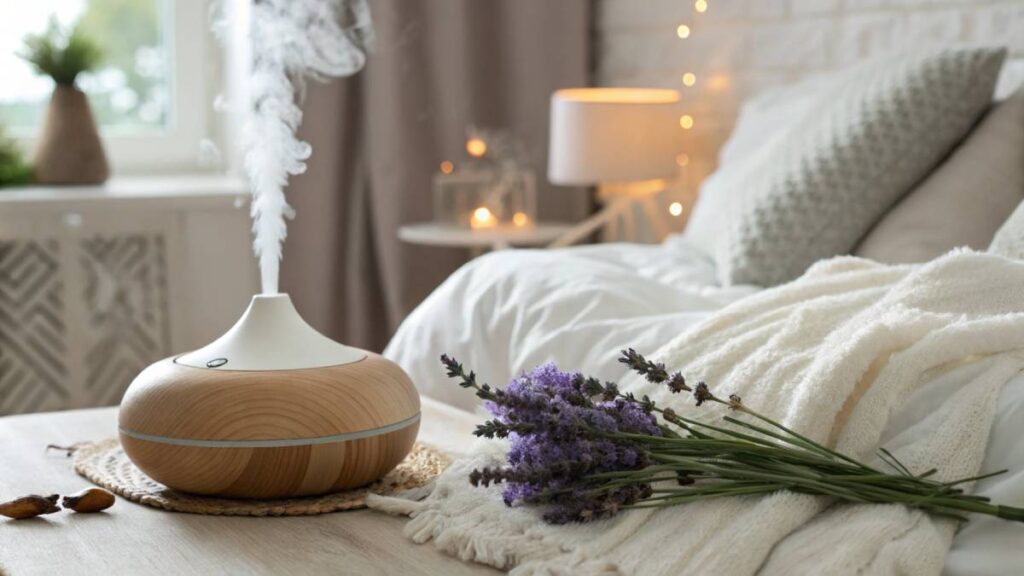
Is lavender essential oil the most effective for sleep?
Lavender essential oil, derived from the Lavandula angustifolia plant, is widely regarded as one of the most effective essential oils for sleep. Its calming aroma has been used for centuries to promote relaxation and reduce stress. Scientific studies have shown that inhaling lavender oil can improve sleep quality and duration. The soothing scent of lavender helps to slow down the nervous system, allowing the body to enter a state of calm conducive to sleep. Many people find that using lavender oil in a diffuser or applying it topically (when properly diluted with a carrier oil) can significantly improve their ability to fall asleep and stay asleep throughout the night.
“Lavender essential oil has long been celebrated for its ability to soothe the mind and prepare the body for restful sleep.” – Dr. Emily Rose, Aromatherapy Specialist
How does chamomile compare to lavender for promoting sleep?
While lavender is often the go-to essential oil for sleep, chamomile is another powerful contender. Roman chamomile essential oil, in particular, is known for its sedative properties and ability to promote relaxation. Many people find that chamomile offers a gentler, more subtle aroma compared to lavender, which can be beneficial for those who are sensitive to strong scents. When used in aromatherapy, chamomile can help reduce anxiety and promote a sense of calm, making it easier to drift off to sleep. Some people prefer to combine lavender and chamomile in a sleep essential oil blend, harnessing the benefits of both oils for a more potent sleep aid.
Can clary sage essential oil improve sleep quality?
Clary sage essential oil is another valuable option for those seeking to improve their sleep quality. This aromatic oil is known for its ability to reduce stress and promote relaxation, making it an excellent choice for a sleep essential oil blend. Clary sage oil contains natural compounds that can help balance hormones and reduce cortisol levels, which is particularly beneficial for those whose sleep issues are related to stress or hormonal imbalances. When used in conjunction with other sleep-promoting essential oils, clary sage can enhance the overall effectiveness of a sleep blend, helping to create a more restful and rejuvenating night’s sleep.
How do I use essential oils to help me sleep better?
There are several effective methods for using essential oils to promote better sleep. The key is to find the approach that works best for you and your individual needs. Whether you prefer to use an oil diffuser, apply oils topically, or create custom blends, incorporating essential oils into your bedtime routine can significantly improve your sleep quality.

What’s the best way to diffuse sleep-inducing essential oils?
Using an oil diffuser is one of the most popular and effective ways to experience the benefits of essential oils for sleep. To diffuse sleep-inducing essential oils, start by choosing a high-quality diffuser that suits your needs. Add water to the diffuser according to the manufacturer’s instructions, then add a few drops of your chosen sleep essential oil or blend. For example, you might use 3-5 drops of lavender oil or a combination of lavender and chamomile. Turn on the diffuser about 30 minutes before bedtime to allow the aromatic molecules to fill the air in your bedroom. As you inhale the calming scent, your body and mind will begin to relax, preparing you for a restful night’s sleep.
Can I apply essential oils directly to my skin for better sleep?
Applying essential oils topically can be an effective way to use them for sleep, but it’s crucial to dilute them properly with a carrier oil to avoid skin irritation. To create a sleep-promoting blend for topical use, mix a few drops of your chosen essential oil (such as lavender, chamomile, or clary sage) with a carrier oil like jojoba, coconut, or sweet almond oil. A general rule of thumb is to use about 2-3 drops of essential oil per teaspoon of carrier oil. Apply this mixture to your temples, wrists, or the soles of your feet before bedtime. The essential oils will be absorbed through your skin and into your bloodstream, promoting relaxation and helping you sleep better.
Are there any essential oil blends specifically for sleep?
Yes, there are numerous essential oil blends specifically formulated to promote sleep. These sleep essential oil blends typically combine several complementary oils to create a synergistic effect. For example, a popular sleep blend might include lavender for its calming properties, chamomile for relaxation, and bergamot for stress relief. Some blends also incorporate oils like vetiver or cedarwood for their grounding effects. Many aromatherapy companies offer pre-made sleep collections or sleep time blends, making it easy to find a combination that works for you. Alternatively, you can create your own custom blend by experimenting with different essential oils known to promote sleep.
What are the benefits of using essential oils for sleep?
The use of essential oils for sleep offers a wide range of benefits, from immediate relaxation to long-term improvements in sleep quality and overall well-being. By incorporating aromatherapy into your nightly routine, you can create a more conducive environment for restful sleep and potentially address underlying issues that may be affecting your sleep patterns.
Combining different essential oils can amplify their individual benefits, creating a more powerful and effective sleep aid.” – Michael Thompson, Sleep Researcher
How do essential oils promote relaxation and calmness?
Essential oils work to promote relaxation and calmness through various mechanisms. When inhaled, the aromatic molecules of essential oils interact with the olfactory system and the brain, triggering responses in the limbic system, which is responsible for emotions and memory. This interaction can lead to the release of neurotransmitters like serotonin and dopamine, which help to reduce stress and anxiety. For example, lavender essential oil has been shown to increase slow-wave sleep, the deep, restorative phase of the sleep cycle. By creating a calm and relaxing atmosphere, essential oils can help quiet the mind and prepare the body for sleep, making it easier to drift off and stay asleep throughout the night.
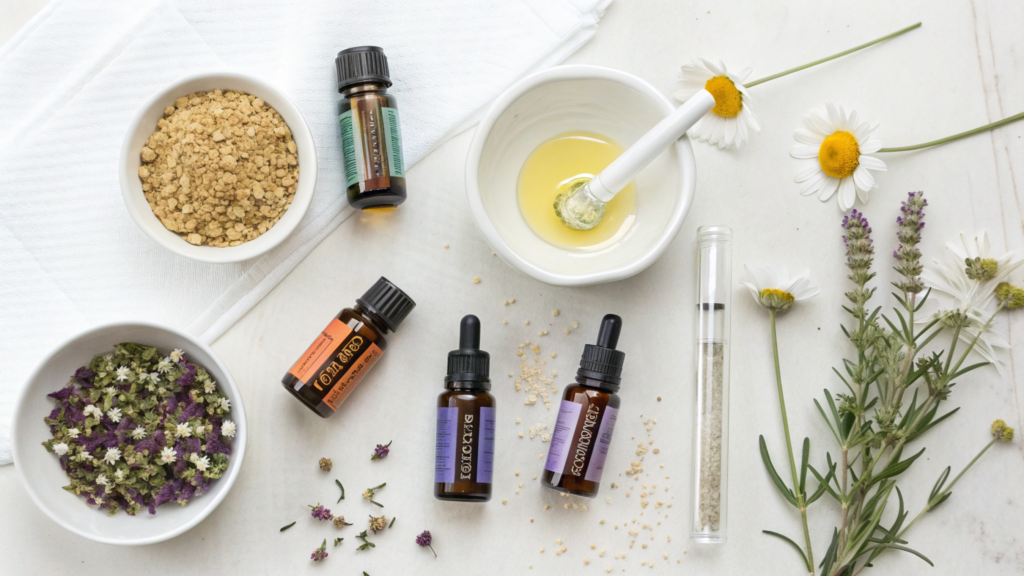
Can aromatherapy with essential oils improve sleep quality?
Aromatherapy with essential oils has been shown to significantly improve sleep quality for many individuals. By using sleep-promoting oils like lavender, chamomile, or bergamot in a diffuser or as part of a bedtime routine, you can create an environment that signals to your body that it’s time to sleep. The consistent use of aromatherapy can help regulate your sleep-wake cycle, making it easier to fall asleep at night and wake up feeling refreshed in the morning. Additionally, the calming effects of essential oils can help reduce nighttime awakenings and promote more restorative sleep, leading to improved overall sleep quality.
Are there any long-term benefits of using essential oils for sleep?
Regular use of essential oils for sleep can lead to several long-term benefits. By consistently improving your sleep quality, you may experience enhanced cognitive function, improved mood, and better overall health. Good sleep is crucial for physical recovery, mental clarity, and emotional well-being. Over time, the use of essential oils as part of a comprehensive sleep hygiene routine can help reduce chronic stress, lower the risk of sleep-related health issues, and promote a more balanced and healthy lifestyle. Additionally, as you become more attuned to the relaxing effects of certain scents, you may find it easier to calm your mind and body in other stressful situations, leading to improved stress management skills.
Are there any precautions when using essential oils for sleep?
While essential oils can be incredibly beneficial for promoting sleep, it’s important to use them safely and be aware of potential precautions. Understanding how to properly use and store essential oils, as well as being mindful of possible interactions or side effects, will help you maximize their benefits while minimizing any risks.
Can essential oils interact with sleep medications?
It’s possible for essential oils to interact with sleep medications, so it’s crucial to consult with a healthcare professional before combining the two. Some essential oils, such as lavender, have mild sedative properties that could potentially enhance the effects of sleep medications. While this might seem beneficial, it could lead to excessive drowsiness or other unwanted side effects. Additionally, certain essential oils may interact with other medications you’re taking, not just those for sleep. Always inform your doctor about any essential oils or natural remedies you’re using, especially if you’re on prescription medications or have underlying health conditions.
Are there any side effects of using essential oils for sleep?
While essential oils are generally considered safe when used properly, some individuals may experience side effects. These can include skin irritation or allergic reactions when oils are applied topically, especially if they’re not properly diluted with a carrier oil. Inhaling essential oils can occasionally cause respiratory irritation or headaches in sensitive individuals. It’s also worth noting that some people may find certain scents overstimulating rather than relaxing, which could interfere with sleep. To minimize the risk of side effects, always start with a small amount of oil, whether diffusing or applying topically, and discontinue use if you experience any adverse reactions.
How do I safely use essential oils around children or pets?
When using essential oils around children or pets, extra caution is necessary. Children’s bodies are more sensitive to essential oils, so it’s important to use lower concentrations and avoid applying oils directly to their skin without proper dilution. For infants and very young children, it’s best to consult with a pediatrician before using any essential oils. As for pets, many essential oils that are safe for humans can be toxic to animals, particularly cats and birds. Avoid diffusing strong oils in areas where pets spend a lot of time, and never apply essential oils directly to your pets. If you’re unsure about the safety of a particular oil, consult with a veterinarian. Always store essential oils out of reach of both children and pets to prevent accidental ingestion.
What are some effective essential oil blends for sleep?
Creating effective essential oil blends for sleep can enhance the benefits of individual oils and provide a more comprehensive approach to improving sleep quality. By combining complementary oils, you can address multiple aspects of sleep, from reducing anxiety to promoting deeper, more restful sleep.
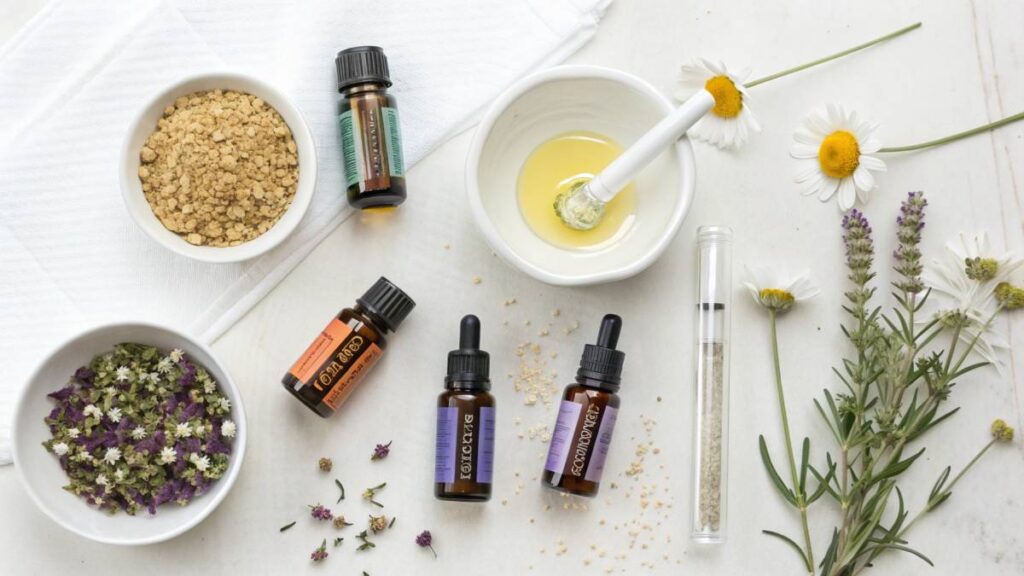
How can I create a lavender and chamomile blend for better sleep?
A lavender and chamomile blend is a classic combination for promoting better sleep. To create this blend, start with 3 drops of lavender essential oil and 2 drops of Roman chamomile essential oil. You can adjust the ratio based on your preference, but generally, lavender should be the dominant scent. This blend combines the powerful calming effects of lavender with the gentle, soothing properties of chamomile. For use in a diffuser, simply add these drops to the water according to your diffuser’s instructions. For topical application, mix the essential oils with a carrier oil like jojoba or sweet almond oil, using about 5 drops of the essential oil blend per teaspoon of carrier oil. Apply this mixture to your temples, wrists, or the soles of your feet before bedtime to promote relaxation and improve sleep quality.
What’s a good essential oil blend with bergamot for sleep?
Bergamot essential oil is known for its ability to reduce stress and promote relaxation, making it an excellent addition to sleep blends. A good essential oil blend with bergamot for sleep might include 3 drops of bergamot, 2 drops of lavender, and 1 drop of ylang ylang. This combination creates a balanced, floral aroma that can help calm the mind and prepare the body for sleep. Bergamot’s citrusy scent adds a bright note to the blend, while lavender provides its well-known sleep-inducing properties. Ylang ylang contributes a sweet, exotic aroma that can further enhance relaxation. Use this blend in a diffuser or dilute it with a carrier oil for topical application. The synergy of these oils can help reduce anxiety, lower blood pressure, and create a peaceful atmosphere conducive to a good night’s sleep.
Can cedarwood be combined with other oils for a sleep-inducing blend?
Cedarwood essential oil is an excellent choice for sleep-inducing blends due to its grounding and sedative properties. A effective sleep blend incorporating cedarwood might include 3 drops of cedarwood, 2 drops of lavender, and 1 drop of vetiver. This combination creates a woody, earthy aroma that can help promote deep relaxation and improve sleep quality. Cedarwood is known for its ability to calm the mind and reduce stress, while lavender adds its well-documented sleep-promoting benefits. Vetiver contributes a deep, earthy note that can help anchor the blend and promote feelings of stability and tranquility. This blend is particularly effective for those who find woodsy scents calming and may be especially beneficial for individuals dealing with racing thoughts or anxiety at bedtime. As with other blends, this can be used in a diffuser or diluted for topical application.
How do customer reviews rate different essential oils for sleep?
Customer reviews can provide valuable insights into the effectiveness of different essential oils for sleep. While individual experiences may vary, patterns in user feedback can help guide those seeking natural sleep aids. Many users report significant improvements in their sleep quality and duration after incorporating essential oils into their nightly routines.
What do users say about lavender essential oil for sleep?
Lavender essential oil consistently receives high praise from users for its sleep-promoting properties. Many customers report that using lavender oil in a diffuser or applying it topically helps them fall asleep faster and enjoy more restful sleep throughout the night. Users often describe feeling more relaxed and less anxious when using lavender oil before bedtime. Some reviewers note that the effects of lavender become more pronounced with consistent use over time. While most feedback is positive, a small number of users report that they find the scent of lavender too strong or that it doesn’t work for them personally. Overall, lavender essential oil remains one of the most highly-rated and recommended options for those seeking to improve their sleep naturally.
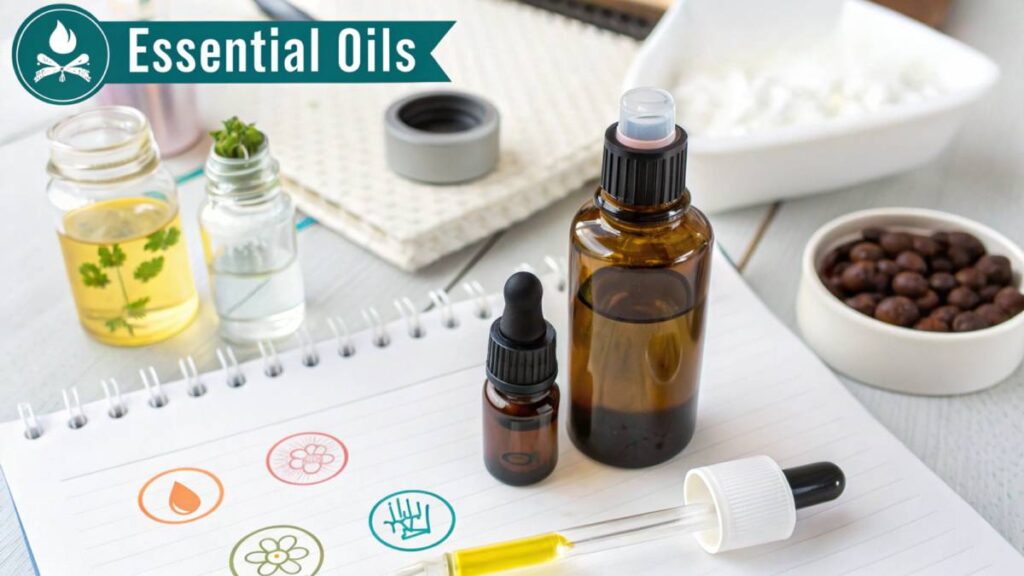
Are there any highly-rated essential oil blends for sleep?
Many essential oil blends specifically formulated for sleep receive high ratings from customers. Popular sleep blends often combine lavender with other calming oils like chamomile, bergamot, or cedarwood. Users frequently report that these blends are more effective than single oils, as they address multiple aspects of sleep and relaxation. Some highly-rated blends include those that incorporate valerian root or vetiver for their strong sedative properties. Customers often praise these blends for their pleasant, complex aromas and their ability to create a relaxing atmosphere conducive to sleep. Many users note that using a sleep blend as part of a consistent bedtime routine has significantly improved their sleep quality and helped them manage insomnia or stress-related sleep issues.
Which lesser-known essential oils receive positive reviews for sleep?
While lavender and chamomile are well-known for their sleep-promoting properties, several lesser-known essential oils also receive positive reviews for improving sleep. Clary sage essential oil, for instance, is often praised for its ability to reduce stress and promote relaxation. Many users report that clary sage helps them achieve a deeper, more restful sleep. Vetiver is another oil that, while less common, receives high marks from those who use it for sleep. Its earthy, grounding aroma is said to be particularly effective for calming an overactive mind.
Main Tips
- Choose High-Quality Oils: Opt for pure, therapeutic-grade essential oils to ensure effectiveness and safety.
- Proper Dilution: Always dilute essential oils with a carrier oil before applying them to your skin to prevent irritation.
- Consistent Routine: Incorporate essential oils into your nightly routine consistently to maximize their sleep-promoting benefits.
- Experiment with Blends: Try different combinations of oils like lavender and chamomile to find the blend that works best for you.
- Create a Relaxing Environment: Use essential oils in conjunction with other relaxation techniques, such as dim lighting and calming music, to enhance sleep quality.
Final Thoughts
Embracing essential oils as part of your sleep routine offers a natural and holistic approach to achieving better rest and overall well-being. Lavender stands out as a powerful ally in promoting relaxation and improving sleep quality, but the benefits extend to other oils like chamomile, clary sage, and bergamot. By understanding how to effectively use these oils—whether through diffusion, topical application, or creating custom blends—you can tailor your approach to meet your unique sleep needs. Additionally, being mindful of safety practices, such as proper dilution and cautious use around children and pets, ensures a positive experience without adverse effects. As you integrate these aromatic remedies into your nightly routine, you may find that falling asleep becomes easier and waking up more refreshing. The synergy of calming scents and mindful practices not only enhances sleep but also contributes to a healthier, more balanced lifestyle. Unlock the potential of essential oils and let their natural properties guide you towards peaceful nights and vibrant days.
Conclusion
Incorporating essential oils into your nighttime routine offers a natural and effective way to enhance sleep quality and overall wellness. Lavender, with its calming aroma, serves as the cornerstone of many sleep-promoting rituals, but the benefits extend to other oils like chamomile, clary sage, and bergamot. Each of these oils brings unique properties to the table, from reducing anxiety and balancing hormones to promoting relaxation and deep sleep. By experimenting with different application methods—whether through diffusion, topical application, or custom blends—you can tailor your approach to suit your individual needs and preferences. Additionally, understanding the importance of proper dilution and safety measures ensures that you reap the benefits without unwanted side effects. As you integrate these essential oils into your bedtime routine, you’ll likely find yourself experiencing more restful nights and waking up feeling refreshed and revitalized. Embrace the soothing power of essential oils and take a step towards a healthier, more balanced lifestyle where peaceful sleep becomes a natural part of your everyday life.
FAQ
What are the best essential oils for sleep, and how can they help promote a better night’s sleep?
A: The best essential oils for sleep include lavender, roman chamomile, vetiver, clary sage oil, ylang ylang, cedarwood, and sandalwood. These pure essential oils can help promote restful sleep by calming the mind, reducing anxiety, and creating a relaxing atmosphere. Studies, including those published in the Journal of Alternative and Complementary Medicine, have shown that these natural ingredients can improve sleep quality and help with sleep problems.
How can I use a diffuser with essential oils to improve my sleep?
A: Using a diffuser is an excellent way to enjoy the benefits of essential oils for sleep. Add a few drops of your chosen oil or blend (such as lavender, roman chamomile essential oil, or ylang ylang essential oil) to your diffuser before bedtime. The diffuser will disperse the oils into the air, creating a calming atmosphere that can help you relax and prepare for sleep. This method is particularly effective for promoting sweet dreams and addressing mild sleep disorders.
Can I apply essential oils directly to my skin for better sleep?
A: While essential oils can be used topically, it’s important to dilute them with a carrier oil before applying to the skin. Mix a few drops of sleep-promoting oils like lavender or vetiver essential oil with a carrier oil such as jojoba or coconut oil. Apply this mixture to your wrists, temples, or the soles of your feet before bedtime. Always perform a patch test first to ensure you don’t have any adverse reactions.
Are there any essential oil blends specifically for promoting calm and relaxation before sleep?
A: Yes, there are several effective blends for promoting calm and relaxation. A popular blend includes lavender, roman chamomile, and ylang ylang essential oils. Another calming blend combines vetiver, cedarwood essential oil, and clary sage oil. These blends can be used in a diffuser, added to a bath, or diluted and applied topically to help prepare your mind and body for rest.
Can eucalyptus and peppermint essential oils be used for sleep?
A: While eucalyptus and peppermint essential oils are not typically recommended for sleep due to their stimulating properties, they can be beneficial for certain sleep-related issues. Eucalyptus can help clear airways, which may be useful for those with congestion-related sleep problems. Peppermint essential oil can help relieve headaches that might be preventing sleep. However, these oils are best used earlier in the day or in very small amounts if used near bedtime.
How can I make a sleep spray using essential oils?
A: To make a sleep spray, fill a small spray bottle with distilled water and add 15-20 drops of sleep-promoting essential oils like lavender, roman chamomile, or ylang ylang. You can also add a teaspoon of witch hazel to help the oils disperse. Shake well before each use and spray on your pillows and bedding before sleep. This DIY spray is a great way to enjoy the benefits of essential oils and create a relaxing sleep environment.
Are there any precautions I should take when using essential oils for sleep?
A: Yes, there are several precautions to keep in mind. Always use pure essential oils from reputable sources. Some oils, like clary sage oil (Salvia sclarea) and ylang ylang (Cananga odorata), can be potent, so use them in moderation. Pregnant women, children, and those with medical conditions should consult a healthcare professional before using essential oils. Additionally, some people may be sensitive to certain oils, so it’s important to do a patch test before widespread use.
How long have essential oils been used for sleep, and is there scientific evidence supporting their use?
A: Essential oils have been used for centuries in various cultures to promote relaxation and improve sleep. In recent years, scientific research has begun to support these traditional uses. Several studies, including those published in the Journal of Alternative and Complementary Medicine, have shown positive effects of essential oils on sleep quality. While more research is needed, the existing evidence suggests that essential oils can be a helpful natural approach to improving sleep for many people.
gaining popularity as a sleep aid, with users reporting that its sweet, floral scent helps reduce anxiety and promote feelings of peace and relaxation. These lesser-known oils offer alternatives for those who may not respond well to more common sleep essential oils or who are looking to expand their aromatherapy repertoire.

